How the ADA changed my life: view from the post-ADA generation
by Jennifer
I am so pleased to introduce Beth Roberson to readers of this blog. Beth is an intern at our Easter Seals Office of Public Affairs this summer and is a rising Junior at the University of Arizona. I am lucky enough to have known Beth and her family for many years and I am so happy she has a chance to share the story of how the Americans with Disabilities Act (ADA) affected her family’s life.
#ADAGeneration
Post by Beth Roberson
My brother Alan has been missing me since I started interning at Easterseals in Washington DC this summer. Alan has autism, and I’m used to his multiple texts throughout the day. It’s rare to get an “active conversation” going with Alan, though, so a call I got from him at work the other day came as a nice surprise, and a delight. My brother has called me before, but this call impressed me by how well Alan did at asking relevant questions instead of being silly.
Alan was phoning from the Easterseals Blake Foundation van, heading to his job on a local landscaping crew. My brother has come a long way in the world since his diagnosis with autism. Similarly, I have come far in understanding the disability world.
When we were little, my brother used videos to learn to talk, and I used videos to learn ASL. In middle school he struggled with outbursts of learning responsibility while I struggled with having a brother who had autism. In high school Alan attended a work program and started learning to work for a paycheck, and I was in high school when I started my job working as a respite worker for a friend of Alan’s — I help him learn to clean and live on his own. I am also working here at Easterseals, and my brother is happily heading to work every day to make money to buy a new DVD.
I was born 5 years after the Americans with Disabilities Act (ADA) was passed. My generation grew up with curb cuts on the cross walks, buses with lifts, accessible college campuses, and the idea that anyone can achieve their dreams, whether they have disabilities or not.
To be honest, I didn’t know about the Americans with Disabilities Act until after I started working at Easterseals. I assumed growing up that it was the world’s job to support those who needed it. Learning the history and the struggle that led to passage of the ADA 25 years ago was shocking — and inspiring.
I had a chance to go to Haiti for a mission trip my freshman year of college and was able to volunteer at an orphanage alongside adults who had autism, Down syndrome and cerebral palsy. I witnessed firsthand how the culture didn’t accept them, and how they had no opportunities to learn to work in the world. I came back thankful my brother had a job and was working to eventually move out and be independent.
I am grateful America decided to help those with disabilities become successful in the world, and while I know there is still a lot to work for in this world, I am grateful my family has had support from places like Easterseals Blake Foundation to help my brother learn to be independent. For the 20 years I have been alive, ADA has been working.
I can’t wait to see where my brother eventually lives and works in the future.
And I can’t wait to see what supports and changes will happen and whether or not I will be a part of it. I miss my brother while I am here interning in Washington, D.C., but I relish his phone calls and texts, and I can’t wait to see where he will be in the next 25 years.








August 10th, 2015 at 9:43 pm
Hi and thanks I was born with mild cerebral palsy and I want Thanks to the ada a lot